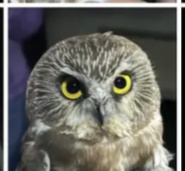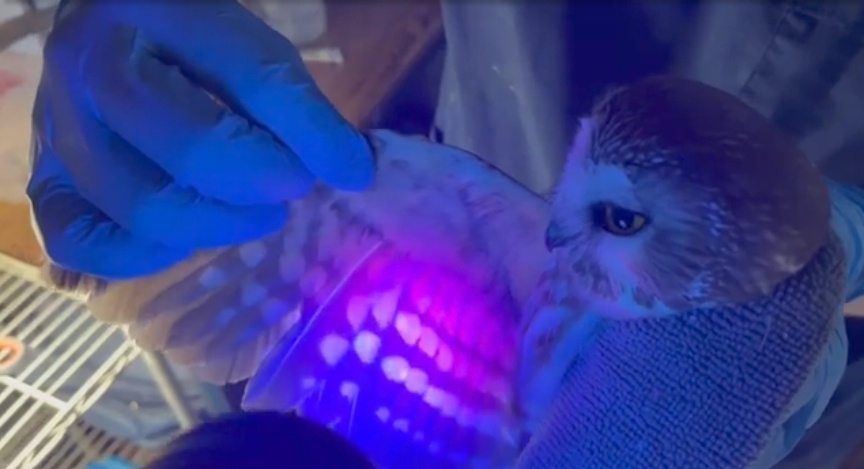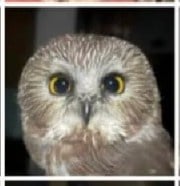From The Owl Research institute
Have you ever noticed how much variation there is in the faces of Northern Saw-whet Owls? Take alook at these side-by-side comparisons and see how different each owl can look from the rest.
One datapoint ORI collects from each owl is the amount of facial white right around the face. As you can see, some owls have a lot of white, and some have hardly any at all; it certainly is interesting to see all the faces that pass through our station.
That one’s got a good bandit mask thing going on!

Ol crazy eye
Lil dude is winking backwards! 🤣
5th row down, 4 in from left is my fav.

What’s yours?

She/he looks coy 🥲
Its modesty is very becoming!
Saw Whet Owls are impossible to tell apart other than observing them during nesting, because the females don’t leave.
There’s no specific color difference. As you see, they have many different looks. The way it is done in the field is by taking weight and wing measurements and comparing that to their age (determined by looking at the wing feathers under an UV light!) and then the observer can use those stats to get a reasonable determination of sex.
 What they are doing is seeing how many feathers have been shed and how many times. Not too dissimilar to counting tree rings.
What they are doing is seeing how many feathers have been shed and how many times. Not too dissimilar to counting tree rings.To be sure, DNA tests are done, but that isn’t feasible for doing a number of owls, such as during a banding program.
That owl must be so incredibly confused about what’s going on. They probably expected to get eaten, but instead this large predator just shines a colored light on their wings, touches them a bunch, then releases them?
I hope the Greys treat us with equal care! 👽
I’m loving all the bonus facts, thanks so much!
Lol I’m glad. I try to not be that old relative that only takes you to do things that are educational. I want people here to have fun, but I just find so many things I feel are amazing to learn about. I try to keep the really dry, hard to understand things like research papers separate, but I like tossing in easy to understand things like how to tell the male/female owls apart.
I skimmed a 10 page research paper to get you that little blep of info. I usually read the whole thing if I have the time and understanding for what it is, but I’m sure most of you just want the tl;dr, and there’s nothing wrong with that!
I just worry I throw too much at you guys sometimes, so I like when you give me feedback like this. I want to give you as much as you want without making it boring. That’s what I think of when I think of my favorite people that have taught me things, and that’s what I want to be for all of you.
I mean I can’t speak for anyone else, but I absolutely love a good infodump! Nothing gets me excited about a topic like listening to someone who is clearly so enthusiastic and passionate about it. It’s one of the best parts of life. Thanks again and I hope you continue!
The one in the middle of the second row: nice and round 🦉
A fine selection!
Head shape was one of my criteria as well!
I’ll add the photo so people don’t have to count:

Really cool to see that the faces of other species are just as varied as our own, even if we don’t always notice it.
Animals may not have the same thoughts, feelings, or relationships as we do, but we do share a lot of basic needs and desires, and a little humanizing of animals I think is good for both sides of the equation.
They’re still living creatures who want to be safe and healthy and raised a family. They can be happy or scared.
I try to see the animals as individuals. Over the last 3 years I’ve been lucky enough to have been able to work from home, I’ve gotten to know my backyard squirrels and bluejays quite well. The squirrels are much easier to tell apart. The jays are too darn fast, but I can tell the younger ones from the older ones. But they all show different personalities and risk aversion and food preferences just like any of you guys would. They’ve been fascinating to me, and I’m really going to miss them going back on site to work. I’ve stopped keeping house pets for a few reasons, so these guys have been my everyday pals for a long time now. They’re all unique little goofballs, and I’ll miss seeing them on a daily basis.
Everyone is special to someone, and I don’t think any creature deserves to be treated as lesser.
So true. Spend any amount of time with domesticated or wild animals, and you’ll realize how they all have unique personalities, preferences, habits, sensitivities and quirks, just like people do. I fully believe they have feelings just like us, even if they probably can’t think about them in the same way we do. I think we are much more alike than we are different.
I had 3 cats I rescued from outside. You would think they hated all of humanity. None of them would be adoptable animals, which is why I kept them after treating their injuries.
They wouldn’t really spend time with me when I was home, even after them living with me for a few years, but they were absolutely upset with me for about a week every time I’d go away for more than 2 days! It was totally on their terms, but I know they had a positive bond with me.
And I still miss them now that they’re gone. They taught me a lot about tolerance and patience and how sometimes you don’t always get the reactions you feel you deserve, but it doesn’t always mean they don’t care, they just show things differently. They were who they were, and I came to respect that.





